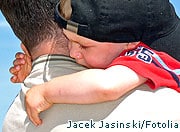A father’s love is just as, if not more, important to a child’s emotional development as its mother’s, a new study has revealed.
Children who did not have a loving father present were more likely to be insecure, hostile and aggressive, researchers said.
According to researchers, children feeling accepted by their fathers was linked to factors such as emotional stability, a positive world view and less hostility.
Loving
By contrast feeling rejected by fathers was linked to problems with anger or rejection, emotional instability and feelings of inadequacy.
Professor Ronald Rohner, the study’s co-author, says children suffer when they feel rejected by their parents, with the effect being more marked for those who feel rejected by their fathers.
“In the US, Great Britain and Europe, we have assumed for the past 300 years that all children need for normal healthy development is a loving relationship with their mother,” he added.
Influence
“And that dads are there as support for the mother and to support the family financially but are not required for the healthy development of the children.
“But that belief is fundamentally wrong. We have to start getting away from that idea and realise the dad’s influence is as great, and sometimes greater, than the mother’s.”
Norman Wells, of the Family Education Trust, said: “This study underlines the importance of intact and stable families where both the father and the mother are committed to bringing up their children together.
“Successive governments have failed to recognise the fact that men and women are different and that they parent differently.”
Valuable
The research was based on 36 international studies, involving nearly 11,000 adults and children.
In 2009 research published by New Scientist magazine revealed that fathers and mothers each play a valuable but different role in raising children.
The magazine cited a study looking at 80 couples with new babies, which found that mothers and fathers made different contributions to their child’s upbringing.

